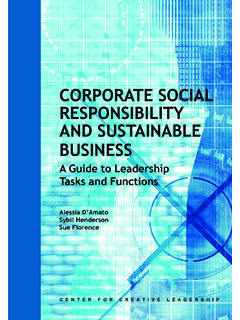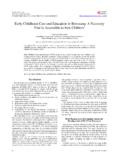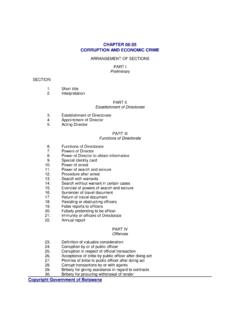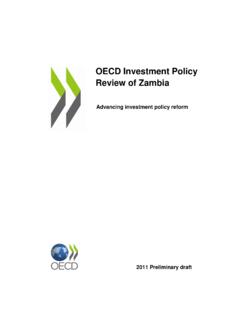Transcription of Leadership Development in Africa A Focus on …
1 WHITE PAPERL eadership Development in AfricaA Focus on StrengthsBy: Regina Eckert and Simon RweyongozaContentsExecutive Summary 1 Leadership in Africa 2 The Strengths of Leaders in West Africa , 4 Southern Africa , and EgyptRisk Factors for Leaders in Africa 9 Developing Leadership Strengths 11 Outlook 14 Further Reading 16 About the Authors 17 2015 Center for Creative Leadership . All rights reserved. 1 Through its research and Leadership Development programs, the Center for Creative Leadership (CCL ) works with some of the largest and most successful organizations in Africa . We ve found that many organizations are investing in both new and experienced managers who can help promote growth and build capacity. The ability to attract and retain effective leaders, though, depends on how each organization develops and sustains its Leadership is no doubt that the need for effective Leadership in Africa is high.
2 But traditionally, talented leaders have not received much structured support for developing their full Leadership potential. For this reason, many organizations in Africa are underperforming. By strengthening Leadership skills, they could improve their business results and strengthen their prospects for sustainable growth and African organizations, especially those on the verge of becoming multinational or international in scope, find that their Leadership challenges are plenty and complex. CCL s research and Leadership Development initiatives show there is hope. Leaders can exceed their current levels of performance by developing their untapped potential ensuring that their organizations are not just adapting to global change, but are effectively using change to their this white paper, we Focus on the strengths of leaders in three regions of Africa (Southern Africa , West Africa , and Egypt) and highlight the regional differences our research has uncovered. We also outline an effective approach to Leadership Development that benefits both leaders and organizations alike.
3 It is being used successfully by CCL in more than 100 countries around the Summary2 2015 Center for Creative Leadership . All rights has traditionally been the cradle of great Leadership . Many African leaders are well known around the world including Nelson Mandela, Kwame Nkrumah, Steve Biko, and Julius Nyerere to name a s contribution to Leadership philosophy has also been remarkable. Two examples: Africa was the birthplace of Ubuntu the belief in a universal bond of sharing that connects all humanity. It also gave rise to Satyagraha and the notion of passive resistance, which Gandhi developed while living in Africa . Both are known around the , though, the demand for effective Leadership and systematic Leadership Development in Africa is growing more rapidly than ever before. A critical shortage of upcoming leaders is responsible for the underdevelopment of organizations in many African countries (Ugwuegbu, 2001). They are underperforming compared to their potential and could improve their performance by strengthening their in Africa While business leaders in Africa today are excited by the many opportunities we see on our continent, tapping into these opportunities requires significant skill.
4 As international companies rush to conquer this new frontier, being internationally competitive and world-class is an absolute requirement. Developing appropriate offerings, mobilizing staff, and aligning business partners in different countries adds complexity at all levels of Leadership . Preparing the organization for the Leadership challenges of tomorrow is the chief concern of CEOs in ambitious organizations. Leon Vermaak CEO, Telesure A leader .. is like a shepherd. He stays behind the flock, letting the most nimble go on ahead, whereupon others follow, not realizing that all along they are being directed from behind. Nelson Mandela 2015 Center for Creative Leadership . All rights reserved. 3 What Leadership skills do organizations need to deal with the complex challenges they face? Managers participating in one of CCL s Leadership Forums in Africa identified the following Leadership challenges: Leading diverse teams Being adaptable to the changing world of work Being able to look at ourselves, be vulnerable, and reflect on Development areas Transferring knowledge and coaching subordinates Encouraging collaboration and communication Orchestrating employee engagement Dealing with complexityCCL believes these critical skills can be developed and can help unlock the Leadership potential in organizations throughout Africa and beyond.
5 Organizations are all the time challenged by market dynamics lots of changes, fierce competition, technological evolutions. A major attribute that makes an organization stand out is the quality of Leadership , which can drive up both personal and corporate performance. That s why investment in management and Leadership is a crucial mandate for success and sustainability. Dalia Esmat Head of Training and Development Mobinil4 2015 Center for Creative Leadership . All rights Leadership is important everywhere in the world, the way that people actually lead can differ by region. Many researchers have examined what good Leadership looks like in Western cultures, but Leadership in most of Africa has not been explored in much depth. What we do know is that ideas about Leadership are tied to culture, religion, educational background, and philosophies like Ubuntu allude to a feeling of high responsibility for one s kin, loyalty to one s ethnic or family group, and a Focus on long-term prosperity.
6 A previous study looking at Leadership in Botswana showed leaders there tended to provide clear direction and targets, and they exhibited a paternal and supportive Leadership style. However, we know little about Leadership in other regions or countries in Africa . As a result, CCL decided to investigate how leaders in Egypt, West Africa (Ghana, Nigeria, Benin, Togo, Guinea, Niger, Burkina Faso), and Southern Africa (South Africa , Botswana, Namibia) are seen by others, and where their strengths and potential weaknesses Strengths of Leaders in West Africa , Southern Africa , and Egypt 2015 Center for Creative Leadership . All rights reserved. 5 MethodologyData for this analysis is drawn from BENCHMARKS , a 360-degree feedback instrument developed by the Center for Creative Leadership . BENCHMARKS is a well-validated tool that rates managers on 16 dimensions of effective Leadership and on five factors CCL research shows are predictive of whether a manager s career will derail.
7 Managers rate themselves and are rated by their bosses, peers, superiors, direct reports, and relevant this study, we analyzed data from leaders in three parts of Africa . Included were 183 managers and 1,475 raters in Egypt, 143 managers and 1,140 raters in Southern Africa (South Africa , Botswana, Namibia), and 55 managers and 499 raters in Western Africa (Ghana, Nigeria, Benin, Togo, Guinea, Niger, Burkina Faso). Most managers took the BENCHMARKS assessment as part of their Leadership Development program at the Center for Creative Leadership . All agreed for their data to be used anonymously for this calculated an average rating for each individual to balance out the perspectives of the bosses, managers, employees, and others who submitted ratings. When we compared individual ratings across the three regions, we found statistically significant differences in 15 of the 21 dimensions assessed by BENCHMARKS .6 2015 Center for Creative Leadership . All rights CCL researchers analyzed the data, we looked first at the rank order of Leadership competencies by strength in the three regions.
8 The results of this are shown in Table 1. Rather than expressing the importance of a competence, this rank order is linked to how well the average leader from each region was rated on each the rankings showed some variation, leaders in each of the three regions got their highest scores on the same five competencies. In all three African regions, leaders were seen as highly skilled at putting other people at ease, being fast and agile learners, and leading in diverse environments. They were also seen as resourceful and able to find creative solutions to problems, and as having a high Focus on outcomes and getting things done. While the exact rank order for these five competencies varies by region, these are the same five characteristics our research shows are most highly ranked in other countries around the globe as it comes to the other Leadership competencies in our study, we found there were some regional differences of significance. For example, decisiveness, straightforwardness, and composure were not ranked as strengths in Egypt and West Africa , while in Southern Africa , these competencies were ranked relatively highly.
9 2015 Center for Creative Leadership . All rights reserved. 7 Rank order of average performance in Leadership competencies in three African regions. Competencies with the highest rank-differences across the three regions are highlighted in red. It is unfortunate that the Leadership in Africa is far too often presented to the world in the form of dysfunctional and derailed Leadership . Africa has an abundance of sound and responsible leaders on all levels and dimensions of society. These leaders need to emerge and become visible. Leadership Development is a key leverage point in the Development and transformation of our beautiful continent. Frik Landman CEO, University of Stellenbosch Executive Development Africa Putting people at ease 1 2 4 4 Being a quick study 2 3 2 1 Differences matter 3 1 5 2 Resourcefulness 4 4 1 3 Doing whatever it takes 5 5 3 5 Change management 6 9 7 8 Decisiveness 7 13 10 6 Building and mending relationships 8 7 6 9 Straightforwardness and composure 9 14 8 7 Participative management 10 8 11 10 Compassion and sensitivity 11 6 12 11 Career management 12 12 14 12 Self-awareness 13 10 13 12 Leading employees 14 9 11 14 Balance between personal life and work 15 16 16 15
10 Confronting problem employees 16 15 15 16 Table 1 EgyptWest AfricaEurope (for comparison only) Leadership Competencies8 2015 Center for Creative Leadership . All rights contrasting leaders Egypt, West Africa and Southern Africa , we found they differ in many dimensions of Leadership . The largest differences are displayed in Figure in West Africa were seen as being more ready to Do whatever it takes to produce results. They were also rated higher in Straightforwardness and Composure, showing more calmness in times of change and crisis, contributing more to solving problems than to complaining about them, and tending to be patient and resilient when tempers run Differences in StrengthsFigure 1 2015 Center for Creative Leadership . All rights reserved. 9 Amr s story highlights how a leader can stall, hit a plateau, and derail from an expected career progression. CCL has conducted extensive research to understand the factors that contribute to derailment and how managers can learn to avoid them.
















